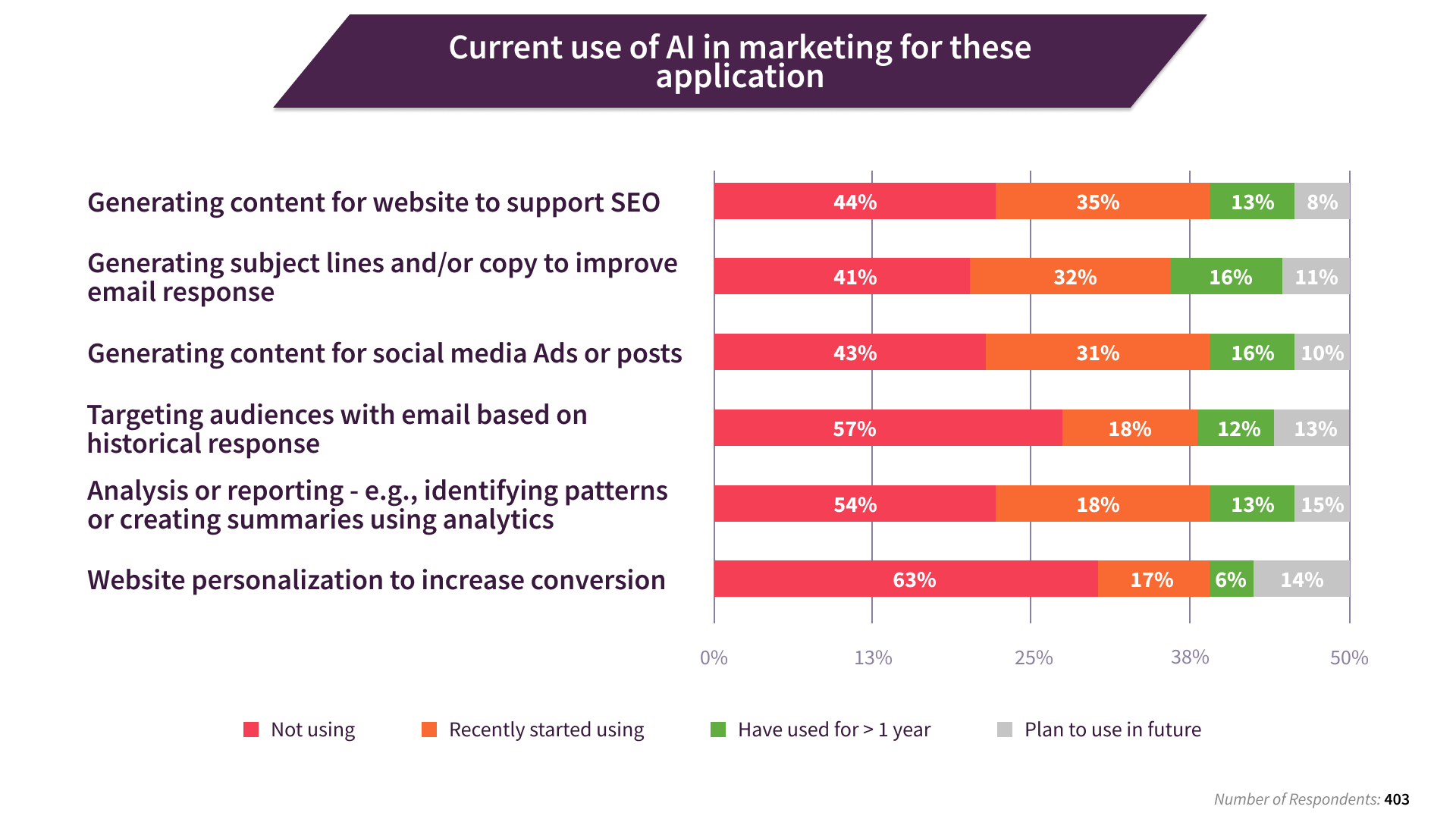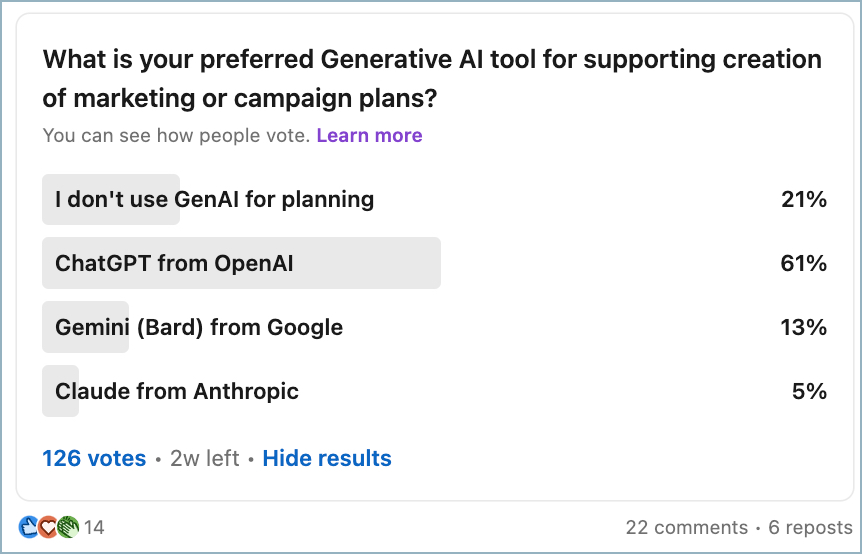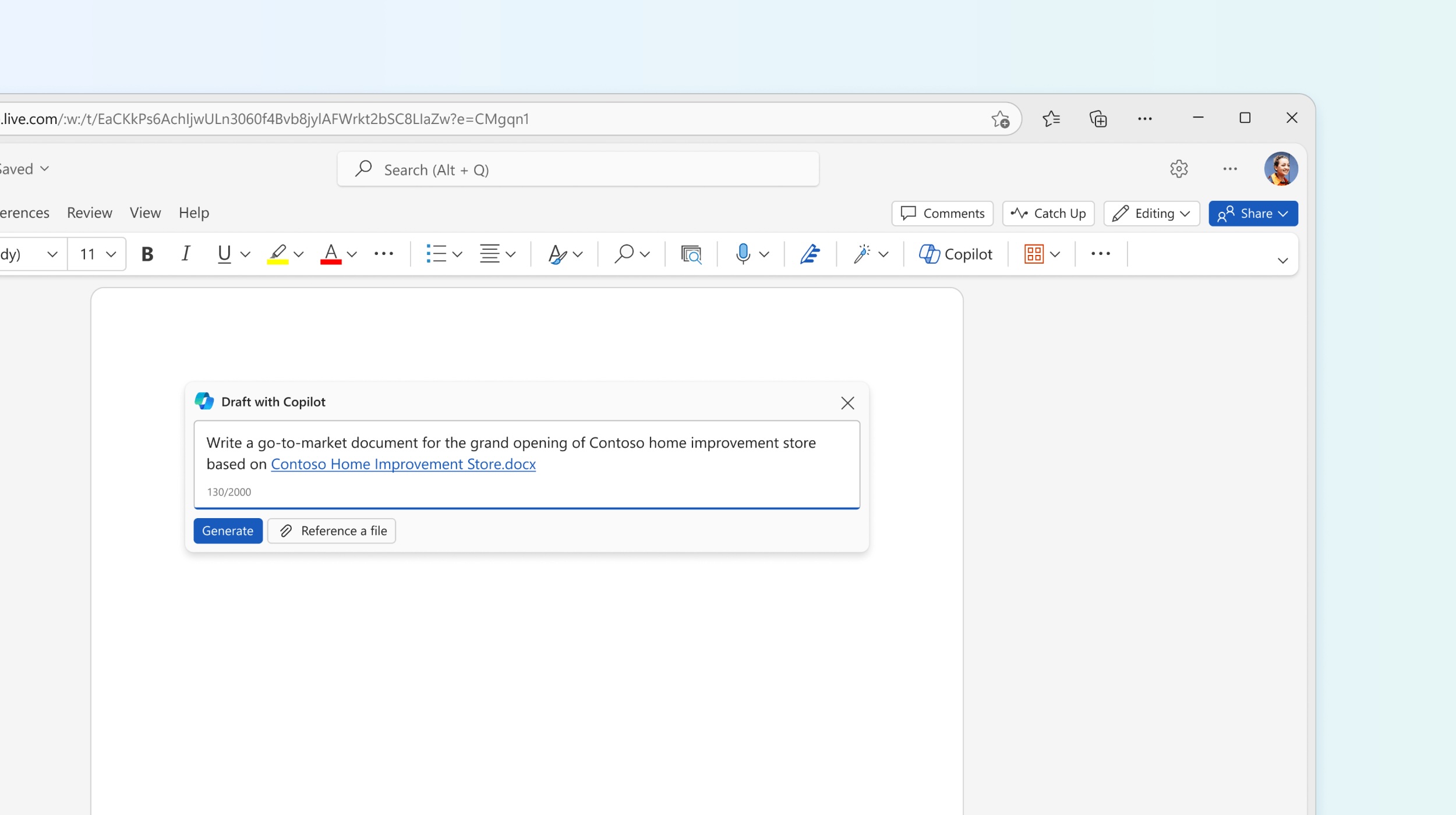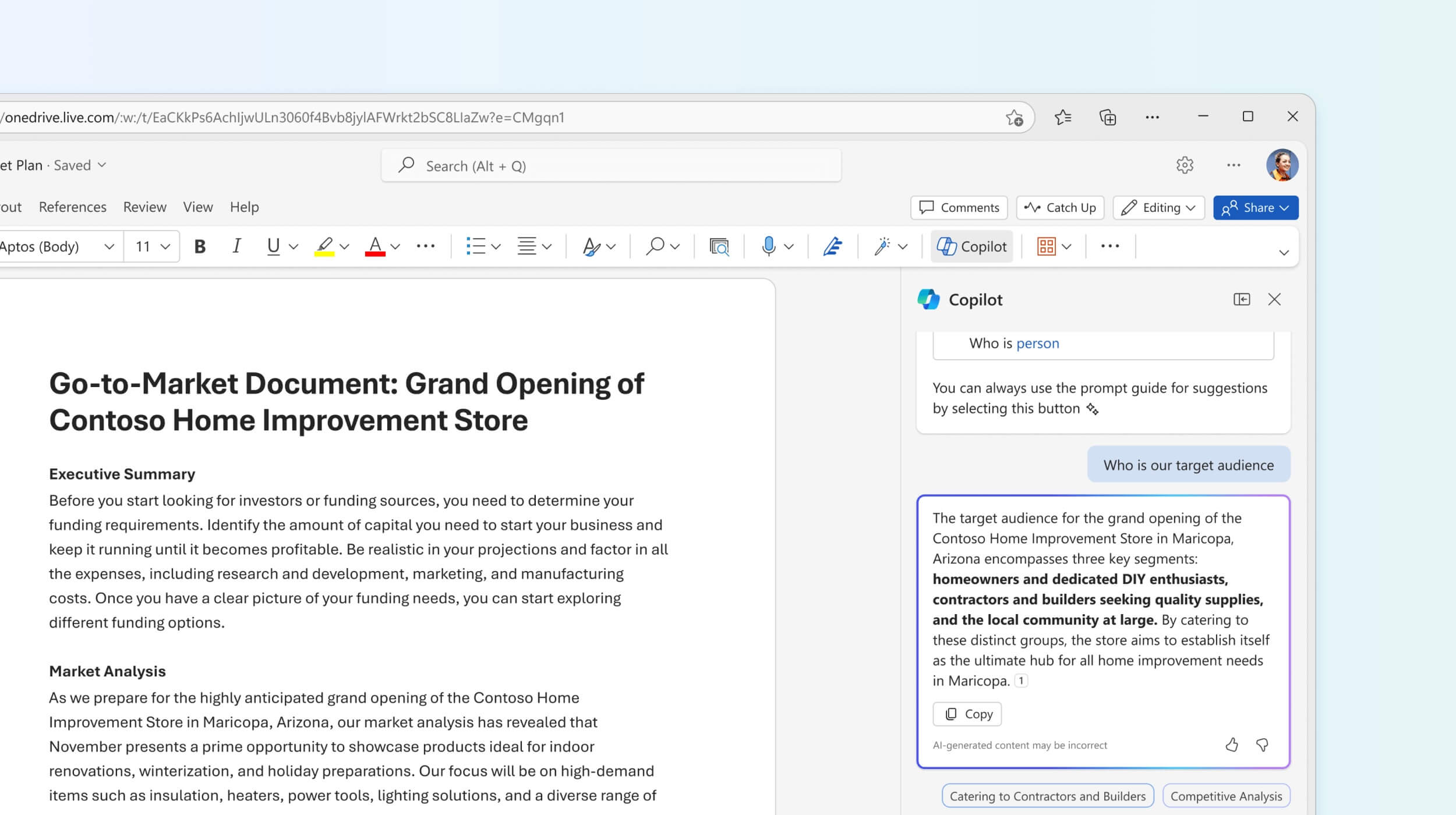From the obvious tools like ChatGPT and Google Gemini to the less obvious like Perplexity, Pi, Poe and more!
As you'll know, 'GenAI' rose to prominence with the launch of ChatGPT from OpenAI in late 2022. Since then, many other less well-known tools have been released that have some advantages over ChatGPT, so should be considered by any 'AI-assisted marketer'.
In this article, I will recommend 10 plus tools to consider, looking in particular at how marketers can use them for writing marketing plans, such as annual marketing plans or campaign plans. We will also look at how many marketers are using generative AI for writing plans and caution against being overly dependant on AI for planning. To be the 'devil's advocate', I will ask should we be using these tools at all?!
How widely is generative AI and ChatGPT used in marketing?
ChatGPT has been widely adopted by marketers, mainly for writing copy based on prompts provided by the user. Our Future of Digital Marketing report 2024 shows that many businesses are actively using Generative AI for copywriting, using large language models such as GPT for writing copy for different channels. The results are sorted below based on the applications with the highest percentage who are using them.

To support our premium members, I have created several different guides with detailed examples of using ChatGPT prompting techniques for email, social media and organic search to better customize marketing copy to a specific audience for a business and their goals. I have also created our popular ChatGPT prompt sheet for marketers as a free download, highlighting some of the prompting skills that 'hands-on' marketers need to know about.
What about using Gen AI for planning?
In the survey, we didn't ask about using GenAI tools to support planning. But we will in the next survey, since a recent LinkedIn poll I ran about asking whether peoople were using AI for planning suggests that many marketers are using AI to support creation of marketing plans already. I was really surprised that the MAJORITY of people doing the poll were using Generative AI for planning. As I'll get into, there are certainly BIG limitations of using AI for marketing planning without intervention, but as a collaborative tool to improve your marketing plans and generate them more efficiently I think it's an exciting development.

How can Generative AI tools support marketing planning?
Some consider AI tools will replace marketers, but we see current tools more as collaborative tools. This is true both for copywriting and planning. They can help support the modern 'AI-assisted marketer' who has many tasks to complete by making them more efficient.
There are some obvious benefits of using Generative AI to support marketing planning which help explain why it is as popular as it is:
- Time saved in creating initial structure of plan
- Summarizing the key points from insight which informs the plan
- Suggestions of strategic approaches that the plan author may not be familiar with
- Recommending the types of goals and measures that are needed to control plans
Despite these, there are many more disadvantages of uaing AI for planning which mean that great caution is needed in trusting plans from AI.
Disadvantages of using AI for marketing planning
Before we look at specific problems of using AI for creating each part of a strategy, it's worth remembering that many alternative approaches to creating and structuring plans have evolved.
If an AI is asked to create a plan, it will often almagamate the many alternative approaches for creating a strategy from their training data set, so there isn't a clear logical structure based on a process of situation review, objective setting, strategy, tactics and implementation.
So, I've found that the structures of plans created by AI are inferior to those produced by an experience planner who knows what a solid plan looks like.
If we think about some of the essential parts of a marketing or digital marketing plan, based around our RACE OSA framework, these are some of the potential challenges which will really limit AI-based plans which don't have sufficient human involvement:
Opportunity
Analysis of situation needs to be based on insight including
- Current performance through analytics and sales reports
- Latest insight on customer profiles, needs and behaviour
- Competitor activity
- Market opportunities from PESTLE analysis
Typically, Gen AIs don't have these types of insight available when creating plans and if they are uploaded are unable to perform the analysis to identify important patterns and to identify key SWOT issues. Anyone who has used Google Analytics AI features will know they are incapable of identifying important levers for improvement. This capability will certainly improve in future as, for example AIs are integrated with databases.
For better results you can already and should provide the AI with market background through custom instructions or uploading documents. AIs are also good at summarising other insights and reports, so they can usefully be used for this already.
Strategy
Strategy must be based on SMART objectives defined as an output of the Opportunity stage. AIs are currently unable to set realistic SMART objectives based on experience or the type of conversion model templates we provide. However, their knowledge is sufficient that they can recommend the type of objectives that should be set, so that is useful for novice planners.
Considering digital marketing strategy, an AI can produce this, but it's typically limited just tactics, a list of channels of channels to consider. A key aspect of strategy is prioritising strategic initiatives arising from the situation review and that ability is also lacking.
Then we come to the fundamentals of strategy: Market Segmentation, Targeting and Brand Positioning. Here I think AIs are particularly lacking since they can be asked for alternative options, which is a useful feature, but can't select the best options based on criteria.
Action
As part of strategy implementation, we recommend a process of 90-day planning which translates strategic digital initiatives into quarterly work packages across RACE such that specific Standard Operating Procedures (SOPs) needed for effective Always on Marketing can be improved.
AI again isn't able to prioritize and can't schedule tasks for particular people to work on the. It is also currently limited for performance review and improvement sessions.
To summarize, here's 10 reasons why you shouldn't solely rely on AI alone for marketing planning:
1. AI doesn't fully understand your audience and market as experienced people do
2. AI can't yet review business performance through analytics to identify opportunities
3. AI can't set realistic SMART objectives
4. AI can't prioritize strategic initiatives
5. AI can't select from segmentation, targeting and positioning alternatives
6. AI has limited creativity and originated - these are essential to brand differentation
7. AI won't be aware of cultural or in-company sensitivities about strategies. They won't know about previous strategies and which were effective or not.
8. AI can't readily integrate business, marketing and digital strategies so they are aligned
9. AI can't prioritize tasks for strategy 90-day plans, for example across the 70 SOPs within the RACE framework
10. AI doesn't have the intelligence to perform performance reviews to diagnose problems and suggest practical solutions.
10 recommendations for different tools for using AI for planning
These recommendations are based on our experience at Smart Insights, plus recommendations from my network when I asked about tools used for planning. Before we review the tools, these are key things to think about when using these tools for planning:
- Although ChatGPT is the best known Generative AI tool, it has limitations for which other services may be better.
- The type of customisation available to make copy or plans relevant to a business, brand tone-of-voice and audience are most important when selecting these types of tools
- These services do not work similarly to a search engine index which has up-to-date content. Large Language Models (LLMs) are trained on a limited dataset which may be months or years out-of-date.
- For example, Google Gemini is often better for more recent information. Claude has a more conversational approach, which can be helpful for developing plans.
- Providers often use a freemium model with access to more sophisticated LLMs with more recent data sources with paid plans
- Specialist Gen AI tools for marketers may be more efficient than generic tools since they are set up for marketing use cases such as writing copy for different channels and may enable more sophisticated options for tailoring to a market and brand tone-of-voice
The best-known generative AI tool since its rapid adoption on launch in late 2023. It has a paid plan, ChatGPT Plus, which gives access to more sophisticated and up-to-date LLMs. As explained in our guides, we recommend using Custom instructions to apply outputs for planning and copywriting to a specific audience, sector, scale and tone-of-voice for each brand.
GPTs can be used on the paid Plus plan to tailor further to the market sector. It can also be used via Microsoft Bing, where since November 2023 it has also been known under the Microsoft AI label for productivity tools as 'Co-pilot' as the example from Word below shows. Text-to-image options are available through DALL-E and text-to-video from Sora.

These examples from Microsoft Labs show how, in the future, support will be available within your writing platform for planning. However, the forums suggest that these tools have been rushed to market and there are many practical problems in using them, including them not running on Mac.

Gemini from Google
Google has invested its considerable budget in this technology since long before the launch of ChatGPT, building on Google's LaMDA family of LLMs. When asked about differences to ChatGPT, Gemini says that it has access to Google Search and other web data in real-time, while ChatGPT relies on a pre-defined dataset, concluding 'this means I can stay more up-to-date on current information'. Like ChatGPT and unlike the search engine, it doesn't cite specific sources for its responses. It also has a premium option, 'Gemini Advanced'. Originally known as Bard until early in 2024.
Claude is worth trialling as a ChatGPT alternative. At this time of writing, Claude offers three different models (Opus, Sonnet, and Haiku) catering to different needs, with Opus aiming for superior knowledge and reasoning. It doesn't image-based tools. Token limits are larger supporting larger prompts and responses which are limited in Chat GPT, particularly on the free plan.
Adding files to make the response more relevant or summarizing content from a URL are both advantages over ChatGPT's free plan.
It has limited availability globally, but its models are also available via Poe from Quora - so we recommend trialling it there.
Jasper
This subscription service was developed specifically for copywriting for marketing before ChatGPT was launched. It offers to write long-form content such as blog posts, reports email and stories in 25 languages. It is suitable for larger teams with people involved in copywriting, but it is relatively expensive per seat compared to the other tools. It provides templates that help define common processes and procedures for using AI within a team.
Writesonic
Like Jasper, this is another service dedicated to marketing. It has separate options for generating copy for use on blogs, social media and email marketing. It also has text-to-image options. Typically, it is a lower cost service than Jasper, but with less sophisticated customisation tools for a brand.
Copy.AI
Another AI tool specific for marketers, this service fits mid-way between Writesonic and Jasper in terms of price. It describes its main use cases as similar: Email, Social media and blogs. It differs from Writesonic in that like Jasper, it has sales and marketing workflows to standardise the approach individuals in a team take to copywriting in line with the brand requirements.
Hoppy Copy
We recommend this copywriting tool, specifically for marketers who work on a lot of email marketing, such as email marketing managers. One of the stand-out features is that it will help with planning and generating welcome or nurture sequences. In my tests, I found that although ChatGPT is capable in writing individual emails it struggles to understand the concept of a sequence.
Hyperwriter
A more generic Gen AI tool. It offers some tools specific to marketers including Facebook and LinkedIn post generators.
Perplexity
Perplexity has a different model from the other tools outlined above. It doesn't have a large language model, but rather is a search interface powered by a large language model (OpenAI's GPT) combined with a search engine (Microsoft Bing). This means that it repurposes search results and provides citations which is a addresses a weakness in some of the tools.
Canva AI
Canva is widely used as a graphics tool by marketers. Using its Free AI Image Generator or Online Text to Image App may be more effective than learning other tools.
Pi from Inflection
Finally, we come to Pi. I have found this the most intriguing of all the tools here since it offers a true conversational interface rather than being based on prompts. It can guide you through a conversation about improving marketing or creating a plan. It's even more impressive than the other tools mentioned!
Pi was created by a company called Inflection AI. Great things were predicted for Pi since it was founded by Mustafa Suleyman, Reid Hoffman, and Karén Simonyan. Mustafa Suleyman was a co-founder of DeepMind and a former VP at Google, known for his contributions to AI ethics and safety.
However, when I first wrote this article, it was announced that Inflection has been brought by Microsoft with the founders and many of the team moving to them. Although Pi is still available for now, I can't really recommend it for planning, unless you want to see the future!










